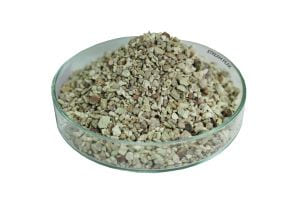Activated Clay
Activated clay desiccant, known as Bentonite, safeguards industrial packaging from moisture and temperature. It is a naturally occurring product that undergoes no chemical alteration during production. This moisture absorber has a high moisture absorption capacity, effectively protecting packed products against moisture-related issues.
Effective Moisture Absorption
Activated clay desiccants are made from natural clay minerals which are processed to enhance their moisture absorption capabilities. The activation process typically involves heating the clay to high temperatures and then treating it with chemicals to increase its surface area and porosity. This activation creates a highly porous structure with numerous small pores and a large internal surface area, allowing the desiccant to adsorb moisture effectively.
As moist air comes into contact with the desiccant, the water vapour molecules adhere to the surface of the clay particles or are absorbed into the pore structure. This process reduces the humidity in the surrounding environment and helps prevent moisture-related issues such as corrosion, mould growth, degradation of products, and moisture damage.
Prevent Corrosion and Mould Growth
Activated clay desiccants can be used in packaging applications, particularly for moisture-sensitive products such as electronics, pharmaceuticals, food, and other items adversely affecting moisture. They can be packaged in desiccant packets placed inside product packaging or shipping containers to protect the contents from moisture during storage and transportation.
We offer a wide range of different customisation options of different sizes and specifications to ensure a tailored packaging solution. We maintain high standards with daily quality checks in our in-house QA laboratory that complies with 9001 and 14000 ISO standards to ensure the clay desiccant meets expectations and provides optimal moisture protection.
- Absorbs 25% of its weight
- Moisture and temperature protection
- Natural and unaltered
- High moisture absorption
- Cost-effective solution
- Porous adsorbent material
- Easy reactivation
- Chemically inert and non-toxic
- Economical alternative
- Absorption capacity: 14-18% (by weight) at 25°C and 80% relative humidity.
- Particle size: 2-5 mm for granular forms and 0.5-1.5 mm for powdered forms.
- Activation level: Typically activated by acid or heat treatment to achieve a surface area of 200-300 square meters per gram and a pore volume of 0.3-0.5 cubic centimetres per gram.
- Packaging: Available in various sizes and forms, including packets, bags, canisters, and bulk containers. Packaging materials can include Tyvek, non-woven fabrics, and laminates.
- Shelf life: Typically has a shelf life of 2-3 years if stored properly in a dry environment.
- pH level: Typically neutral to slightly acidic (6-7.5).
- Bulk density: 0.65-0.85 grams per cubic centimetre for granular forms and 0.45-0.65 grams per cubic centimetre for powdered forms.
- Moisture content: less than 2% by weight.
- Temperature resistance: Withstand temperatures up to 100°C without losing its adsorption capacity.
- Humidity resistance: Maintain its adsorption capacity in humid conditions of up to 90% relative humidity.
- Toxicity: Non-toxic and safe for use in food and pharmaceutical applications.
- Environmental considerations: Can typically be disposed of in regular waste or recycled and are not known to cause environmental harm.
Activated Clay Product Brochure - Humi Pak Malaysia: Download


